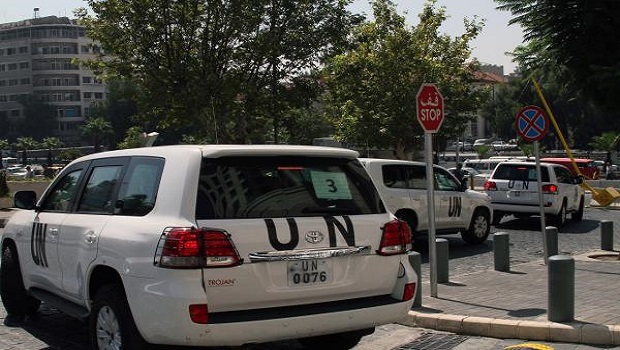
A convoy of United Nations (UN) vehicles leave a hotel in Damascus on August 26, 2013 carrying UN inspectors travelling to the site of a suspected deadly chemical weapon attack the previous week in Ghouta, east of the capital. (AFP PHOTO/STR)
The UN team reportedly left their hotel early Monday morning, although it is not known whether they were headed to the site of the alleged massacre. At least two mortar bombs struck near the hotel where the UN team is staying before the convoy left.
A few hours later, the Office of the Spokesperson for UN secretary-general Ban Ki-moon tweeted that one of the vehicles carrying the UN inspection team was “hit by sniper fire. Team replacing vehicle & then returning to area.”
A statement from the same office later confirmed the tweet, emphasizing that “all sides need to extend their cooperation so that the Team can safely carry out their important work.”
In the meantime, international efforts to find an effective response should the accusations of a neurotoxic attack be proven.
US president Barack Obama and British prime minister David Cameron have agreed that the Syrian government is responsible for the use of a neurotoxic chemical on Wednesday.
French president François Hollande has expressed his support for the positions of Washington and London, stressing that the attack should not be allowed to go unpunished.
In an interview with Europe 1 Radio on Monday morning, French foreign minister Laurent Fabius said that the international community must agree on a “proportionate response” to the use of chemical agents. He added that the only response he cannot picture “is to do nothing.”
News also emerged on Monday morning that German foreign minister Guido Westerwelle has said that the world must respond if allegations of chemical weapons use are proven, and that Germany would be part of that response.
Westerwelle’s remarks came only a day after the German defense minister, Thomas de Maiziere, said he could not picture a military intervention in Syria and that only a political solution would suffice, widely interpreted as a sign that Germany would not become involved in any international military efforts.
In an interview with the Russian daily Izvestia published Monday, Syrian president Bashar Al-Assad vehemently denied that this forces had used chemical weapons and warned that “failure awaits the United States as in all previous wars it has unleashed, starting with Vietnam and up to the present day” if it were to take military action in Syria.
The Syrian government capitulated to international pressure on Sunday, agreeing to allow international inspectors to visit Ghouta. However, both Syria and Iran, one of the strongest allies of embattled president, warned that any attack on Syria will not be a “walk in the park.”
The Syrian foreign ministry’s statement issued on Sunday announced the agreement between Syrian authorities and the UN to allow the UN team currently in Syria to investigate the “allegations” about the use of chemical weapons in the Damascus suburbs.
The Syrian Arab News Agency (SANA), quoted an unnamed foreign ministry source as saying: “An agreement was reached today [Sunday] in Damascus between the Syrian government and the UN on a joint understanding that becomes effective immediately, allowing the UN team, led by Professor Ake Sellstrom, to investigate the allegations of chemical weapons in the Damascus suburbs.”
UN chief Ban Ki-moon’s office also issued a statement on Sunday saying that the Syrian government has agreed a ceasefire in the area on the outskirts of Damascus during the time when the UN team is conducting its investigations.
The United States said Damascus’ agreement had come “unbelievably late.”
An unnamed senior US official told French news agency AFP: “If the Syrian government did not have something to hide and wanted to prove to the world that it did not use chemical weapons, it would have stopped its attacks in the area and provided the UN team immediate access to it five days ago.”
US Secretary of State John Kerry has made a series of phone calls to foreign ministers in the region, including, Saud Al-Faisal of Saudi Arabia, Ahmet Davutoğlu of Turkey, Nasser Joudeh of Jordan, and Abdallah Bin Zayed Al-Nuhayyan of the United Arab Emirates.
The US Department of State also revealed that Kerry had made a telephone call to Syrian foreign minister Walid Al-Mouallem on Thursday. In the Thursday press briefing, State Department spokesperson Jen Psaki said that “if the regime has nothing to do with these attacks, if there was not a use of chemical weapons here, there’s no reason they wouldn’t let the UN team that is on the ground, available, happy to investigate, in to do just that.”
Kerry also spoke to Arab League chief, Nabil Elarabi. Following the conversation between Kerry and Elarabi, the Arab League called for an emergency meeting in Cairo tomorrow to “discuss the dangerous situation in Syria.”
US senators John McCain and Lindsay Graham have criticized Obama for “staying impartial for too long.” They warned that the Syrian conflict “has become regional and was a threat to some of the closest allies of the US in the Middle East.”
The Syrian government, meanwhile, has categorically denied the accusations, and is accusing the opposition of responsibility instead. Information minister Omran Al-Zoubi said, “We and our friends [Russia] have indelible evidence that the missiles were fired from the positions of the terrorist groups.”
Zoubi added: “In the event of a US military intervention, there will be dangerous repercussions in the form of chaos and a fireball which will burn the Middle East as a whole.”
Iran also warned the US not to cross the “red line” in Syria, saying that will have “serious consequences.” The Iranian Fars news agency quoted the chief of staff of the Iranian Armed Forces, Masoud Jazaeri, as saying that “America knows the red line of the Syrian front, and if it crosses it, the consequences to the White House will be very serious.”
